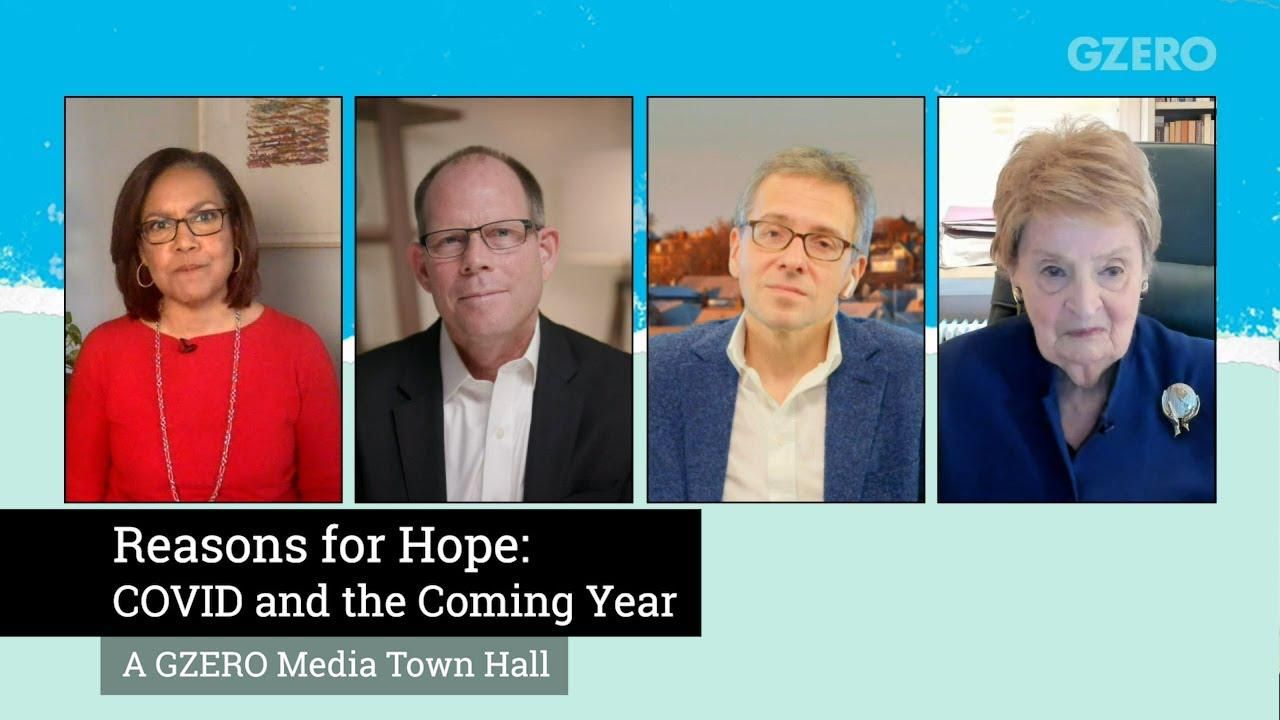Hope in the aftermath of COVID: Town Hall on vaccines, global cooperation, and equitable recovery

The coronavirus is the biggest crisis of the 21st century. Yet the global response lacked the international coordination that marked other major crises in recent history. Why? Probably because the sheer scale of the public health emergency overwhelmed most countries, including the US, the world's largest economy.
The virtually zero coordination was "astonishing," Eurasia Group President Ian Bremmer said during a special town hall hosted on December 4th by GZERO Media in partnership with the Bill and Melinda Gates Foundation and Eurasia Group, moderated by CNBC health care correspondent Bertha Coombs. Also surprising, Bremmer added, was the fact that many nations that we expected to do well ended up failing as the pandemic became politicized, they didn't lead with science, and were slow to act.
Now, the good news is that the end of the pandemic may soon be within reach thanks to the development of effective vaccines. But that's just the first step, according to Gates Foundation CEO Mark Suzman.
The immediate challenge, he said, is how to get the vaccines to the billions of people that need them, many of which may have to take two doses for maximum protection against COVID-19. In developing countries, the experience of dealing with Ebola in West Africa shows us it can be done, but it will be no walk in the park. And the long-term solution to the lack of cold-storage infrastructure in many parts of the world is a vaccine that is cheap, can be manufactured at scale in multiple locations at the same time, and can be easily distributed.
Not to mention the problem of many people who won't be willing to roll up their sleeves. For Professor Heidi Larson, Director of The Vaccine Confidence Project, in an era of politicized hyper-uncertainty around vaccines, the way forward is not to try to cancel such attitudes but rather educate and convince skeptics by helping people connect the dots with pieces of information.
Larson is confident that if we get it right and bring the right people along, a lot more people will get vaccinated — dramatically improveing our odds of defeating COVID-19 in 2021.
The key to success in building trust is doing so in such a way that bridges the gap with just science by using "validators" that wield influence within certain communities, Suzman said reflecting on Gates' experience in vaccination campaigns in parts of the world where there was deep suspicion.
At the end of the day, though, human beings are actually creatures of herd behavior, so achieving COVID-19 herd immunity is only a matter of convincing enough people to follow others on taking the vaccine, Larson added.
While vaccines get rolled out, another problem is how governments can help address the impact of hundreds of millions of jobs lost, many of which are not coming back to the acceleration of the digital workplace and the post-pandemic prominence of a tech-driven labor market in many countries.
Minouche Shafik, Director of London School of Economics & Political Science, said that the most important societal consequences of COVID-19 may be the erosion of the social contract between governments and citizens, and the hollowing out of the middle class.
At a time when many are calling to expand the welfare state to support those who have been disproportionately affected by the pandemic, Shafik explained it's time to debunk the myth that it's really about taking money from the rich to give it to the poor, when in reality it's a system you pay into so you have resources so you have a "piggy bank" of resources to draw on when hard times come.
Going back to the lack of cooperation on a global crisis, many world leaders have criticized the US decision to go at it alone, withdrawing from the World Health Organization and most multilateral fora under Trump's "America First" response to COVID-19.
For Madeleine Albright, the former US Secretary of State, America is still the world's indispensable nation, but that doesn't mean alone. Rather, the pandemic should give the country time to reflect on its ideal role in the world, which in the future should rely much more on partnerships with its allies. COVID-19 has demonstrated that no single country can deal with such a crisis on its own, and it has underscored the need to reform not just how the US deals with multilateral institutions but also ro reform the UN itself.
Albright said that the US doesn't always need to be in the driver's seat, but it cannot be AWOL. Bremmer agreed, adding that leaving WHO was an "obscene" move that the incoming Biden administration will surely reverse once the new president is sworn in, along with rejoining the Paris Climate Accord and signing up to the COVAX initiative to ensure equitable access to vaccines worldwide.
"Reasons for Hope: COVID and the Coming Year" was the third event in a series presented by GZERO Media in partnership with Eurasia Group and the Bill & Melinda Gates Foundation, publisher of The Optimist. Watch our previous events, "Could Our Response to COVID Help End Poverty?" and "Ending the COVID-19 Pandemic".
Watch the above video for more insights from our panelists.